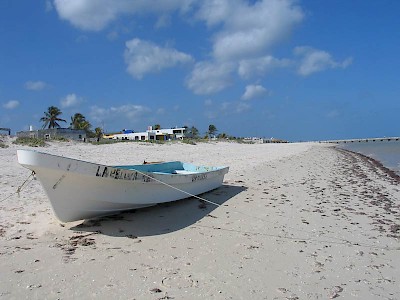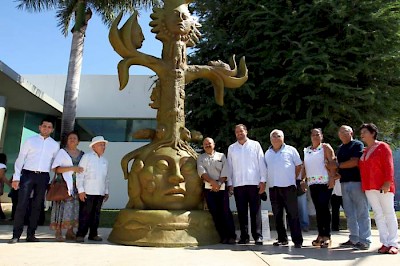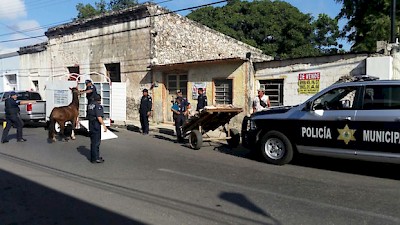Yucatan News: The Sea and the Internet
Value for Effort: Yucatan Octopus Industry
Since the season began in August, Yucatan’s fishermen have caught approximately 14,000 tons of pulpo (octopus), at a total value of MXN 700 million (USD 41.6 million). The industry employs 12,000 fishermen on 600 larger vessels and more than 4,000 smaller boats. The pulpo industry is also responsible for an additional 12,000 jobs in packing houses, shipping, and administration. Octopus fishermen worked hard with the National Aquaculture and Fisheries Commission to manage to manage this fishery to the point where it is not only sustainable, but also has made Mexico the world’s fourth largest producer of octopus. Yucatan is now the state with the largest number of certified plants (23) for the processing of octopus and lobster.
Yacht Committee of Progreso Wants “Sonic” Information
The hunt for oil under the sea along the coast of Yucatan, is underway and has been killing fish, pulpo (octopus), lobster and other marine life for several months. Especially hard hit are the grouper, a fish species that Yucatan’s fishermen have worked so hard to return to profitable numbers. Underwater sonic exploration makes use of compressed air guns that shoot sound that is louder than a jet engine every nine seconds. These ships are big and can sit in one spot and shoot their air guns as far out as a 6 kilometer circle around the ship before moving on. When the Yacht Committee of Progreso attempted to contact authorities for information about what is happening off the coast of Yucatan, they wrote to the State Director of Fisheries and Aquaculture and were told that was the wrong agency. They have to make complaints to federal agencies, such as the Ministry of the Marina and Profepa. Once they have their data in hand, local fishermen and boat owners are urged to make their complaints as quickly as possible to avoid permanent damage to vulnerable fish populations such as the grouper. Unfortunately, reporting to Profepa usually doesn’t happen until after the damage is done. Many locals are thrilled to see oil exploration coming to Yucatan because oil workers make more money than fishermen. However, fishing is one of the most profitable export industries in Yucatan and certainly one of the biggest employers. In addition, the fishing industry works hard at being environmentally responsible as possible, which cannot always be said of the oil industry (an understatement if there ever was one...). In the end, if oil is found off the coast of Yucatan, apparently these two industries will have to find a way to coexist.
Mexico Unveils Seven New Fish Management Plans
Over the past several years, we have watched as Yucatan’s fishermen participate in a number of voluntary bans on fishing for certain species at different times of the year, and we have seen these species come back in record numbers. We were unaware that there were three formal projects like this going on in different ports around Mexico. Now, these have been formalized and the announcement has been made that seven more fish management plans are in place. The following is from the latest news at FIS (Fish Information Services).
The Mexican management plans that have already been published are for three-rowed sea cucumber (Isostichopus badionotus) and Florida sea cucumber (Holothuria floridana) in the Yucatan Peninsula and yellowfin tuna (Thunnus albacares) of the Gulf of Mexico. (Note: black market sea cucumber sell for $300 USD per pound in China and would be wiped out if not for these management plans). Those [plans] under review by the National Fisheries Institute and ready for publication are the blue crab (Callinectes sapidus) and brown crab (C. rathbunae) fisheries in Tamaulipas and Veracruz; geoduck (Panopea sp.) in Baja California Sur, Sonora and Sinaloa, and spiny lobster (Panulirus sp.) on the peninsula of Baja California.
There are additional plans for the American cupped oyster or eastern oyster (Crassostrea virginica) in the Gulf of Mexico and abalone (Haliotis spp.) on the west coast of Baja California. These are added to updated management plans for the red grouper (Epinephelus morio) and associated species in the Yucatan Peninsula and the yellowfin tuna (Thunnus albacares) in the Pacific Ocean. Plus, there are also updated management plans for the crab (Callinectes spp.) in Sinaloa and Sonora, giant squid (Dosidicus gigas) in northwestern Mexico, mullet (Mugil cephalus) and white mullet (Mugil curema) in Tamaulipas and Veracruz, the seabob (Xiphopenaeus kroyeri) in Campeche and Tabasco, pink shrimp (Farfantepenaeus duorarum) in Campeche and octopus (O. maya and O. vulgaris) in the Gulf of Mexico and the Caribbean Sea, among others. Thus, the next time we see the oil industry claiming that it will bring jobs to fishermen, it must be remembered that Mexico, not just Yucatan, is home to one of the most important (and soon to be best managed) fishing industries in the world today.
In an era when worldwide food safety and security is never far from the minds of anyone, we need only look at the successes of the fishing industry in Yucatan to see the benefits on a local and global scale. This is one place where good stewardship of the environment has paid off in a big way. It is also doubtful that the oil industry could replace the sheer numbers of jobs for fishermen and related fields associated with packing, shipping, and management. This makes the fishing industry in Mexico a formidable opponent to threats from other industries and conflicts will be interesting to watch.
Search for Your Name on Facebook
With all of the requests for donations and funding that come in every day on Facebook, you might want to check to see if your name is being used by one of these scams. This week, the State Secretary of Administration and Finance, Alfredo Dájer Abimerhi, discovered an account in his name on Facebook where he had supposedly written to any number of heads of municipalities and government organizations, promising a number of “perks” if they would make cash deposits into certain fraudulent bank accounts. Needless to say, the State Attorney General’s Office is on the trail of these fraudsters and the public is reminded that every peso that comes into the government is disclosed daily in the Government Gazette. But what about Help the (sick children, poor children, puppies, kittens, environment, and on and on)? Are these Facebook pleas for money on the up and up? Are any of them being made in your name? Especially during the holidays, let reason – rather than emotion – be your guide, don’t send money to strangers, and double check your own name every once in a while.
Coming December 1: A Shelter for Children with Cancer
The Albergue de la Asociación 'Hogar de Ángeles, IAP’ will give young cancer patients at the ISSSTE Hospital an opportunity to leave the hospital and spend much needed time with their families. It has 24 rooms, 70 volunteers, and serves children from the ages of two to 12. They can stay there with their families for three to five days, with food, transportation to and from the hospital, and emotional support all provided for them. Although they will begin service on December 1, the official opening ceremony will be December 14, with everyone invited. If you would like to donate cash, provide an “in kind” donation, or volunteer your time, please call 930-66-53 or 9991 63-33-10 or visit their offices located in front of the Parish of Cristo Resucitado, in Colonia Montecristo.
Dial 911 Coming to Mexico
If you currently live in Mexico, you most likely have a long list of emergency numbers, hopefully close enough to the phone that you won’t have to search for them if you need them. Your list will include such numbers as 060 (local police), 061 (judicial and preventive police CITY), 065 (Mexican Red Cross), 066 (Citizen Emergency Response System), 068 (Fire) and 080 (security and emergencies). The number 089 will continue to be used to make anonymous complaints through the Executive Secretary of the National System of Public Security. All other emergency numbers will migrate to the 911 number. The only issue now is that, when pilot programs have been attempted, the 911 dispatchers have gotten all kinds of calls that are not emergencies. At this point, there has not yet been word as to when the 911 emergency number will be implemented in Yucatan.
Exhibition: 20 Maya Gods Installed at Merida Airport
This exhibition is absolutely marvelous. The sculptures are by Reynaldo Bolio ‘Paccelli’ and the exhibition is located in the corridor outside of the International Airport in Merida. Also included are several sculptures of Yucatan’s most notable composers. No closing date was given on this exhibition, so do make it a point to go out to the airport soon.
Yucatan’s Police in Top Four in Mexico
Common Cause has released its assessment of the development, behavior and effectiveness of the police in every state in Mexico. Their findings included assessments of career development, the processes of selection and recruitment, promotion, wages, and differentiation by grade and hierarchical scales. While it is a great honor to be one of the top four in the nation (Guanajuato, Queretaro, Yucatan and Mexico City), we know how Yucatan feels about being number one. We have no doubt that every police department, at every level in Yucatan, is working to become the best professional police force in the nation by this time next year. Just recently, we were so happy to see that not only are the police protecting human citizens, but they are beginning to actively enforce the animal welfare and cruelty laws that have been put into effect in Yucatan. We are very proud of the police in Yucatan and deeply grateful for their providing us with a level of safety and security that is unique in almost all the world.
It’s Beginning to Look a Lot Like Christmas
Tens of thousands of poinsettias have already arrived in Merida from around the country. Twenty thousand of these beautiful plants came from just one nursery in Morelia, Michoacan. At the same time that these plants go on sale, Christmas trees appear in all of the shopping malls. It won’t be long until the entire city is decorated and becomes a Christmas wonderland. Progreso put up its Christmas tree last weekend and we can look for huge displays at every monument in Merida.
Yucatan Fighting Internet Addiction
Yucatan’s Mental Health Division of the Ministry of Health is working on helping people, mainly children and teenagers, identify the antisocial behaviors that come with internet addiction, social network sites, smart phones and video games. Social networks are a particular problem, with Whatsapp and Facebook being the platforms that seem to create the biggest problems. Look for public forums and conferences that seek to prevent addictions and provide strategies for the responsible use of today’s technology. To Yucatan’s credit, this is being recognized and treated as a mental health issue.

















Comments
Dian M 10 years ago
I was wondering if there is any toy drive or any local non-profit organization or orphanages in Merida that can use some donation (we can bring toys or vitamins or toiletries for children or school supplies) this Christmas season? We will be there from 12/24-12/26.
Appreciate inputs that you can give.
Thank you
Diane
Reply
Working Gringa 10 years ago
The Food Bank run by Sharon Helgason, the Oasis of San Juan, the Chelem Christmas drive... all those and more are listed on this page, along with contact information. Thank you for bringing anything for those in need!!
http://yucatanliving.com/daily-life/volunteering-opportunities-in-yucatan
Reply
Andrea Schuman 10 years ago
I applaud your positive stance toward Mexican environmental regulation. However, unfortunately it exists more on paper than as a part of reality. I am a researcher in the area, but will limit my comments to my non-professional observation of the presence of mero (grouper) in many seaside restaurants during the "veda," or closed season, last year. I think you will also find that many specialists in the area (researcher at Cinvestav, for example) consider the mero to be threatened.
Reply
Working Gringa 10 years ago
Thank you for this information Andrea. Is there anything you suggest we should do to help with this? Abstain from eating mero or ??
Reply
Mary Lou Martin 10 years ago
I hope the price of oil will help put a stop to the destructive "searching for oil" procedures in the Gulf. And I also hope your statement that "the fishing industry in Mexico [is] a formidable opponent to threats from other industries and conflicts..." proves to be true in getting those exploration ships away from the Yucatan. I sure hope they're getting help in penetrating the sea of red tape that surrounds any government agency.
Reply
(0 to 5 comments)